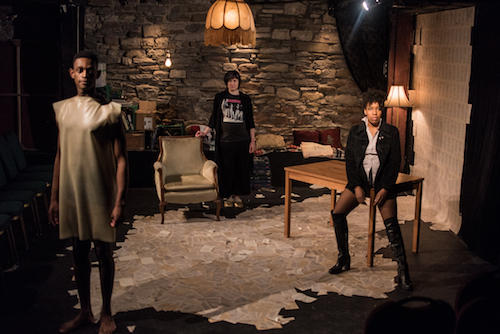
Jen Silverman’s Still is based on the almost-true story of a woman’s stillbirth, as told in professor Lisa Heineman’s memoir Ghostbelly. It’s wonderfully theatrical, with rich language and inventive, complex characters, in particular featuring a trio of fascinating, strong women. The play won the 2013 Yale Drama Series Prize, and Binocular Theatre‘s production at Unit 102 is its first professional one following a run at Juilliard. It definitely has the feel of graduate theatre school about it (in a good way), packed with a polished, controlled rawness and delighting in the form.
Morgan, a 41-year-old divorced college professor of entomology, followed all the rules, but by the time her midwife Elena called 911, her baby was already dead. Both women feel a great deal of guilt over events they’re not sure they could have controlled, with Elena additionally fearing the loss of her license. In Elena’s search for punishment and forgiveness, teenage dominatrix Dolores comes into the mix, particularly once she learns of her own pregnancy. And, to complicate matters, the child is missing from the morgue — and he’s walking around through encroaching rigor mortis, trying to find his mother.
Each of the female characters represents a duality between a different kind of strength and vulnerability. Their behaviour is refreshingly unexpected while remaining in character. Played with great crackling intensity by Alicia Richardson, Dolores is tough and unforgiving, but also young and needy (I was sold on her need, if not her age). Julie Tepperman’s Elena is neurotic and guilt-ridden, but unwilling to compromise her professional future, tempering twitchy awkwardness with small amounts of steel. Morgan’s (Annemieke Wade) loss and pain are palpable, but so are her humour and resolve. In her own way, she acts as mother to each of the characters, projecting a tough love that’s warm but refuses to excuse cowardice.
The acting is a real treat, matching the complexity of the characters. However, the playwright says that the characters have to “exist in moments of extremity,” which means the overall tenor of the play is pitched high and loud, which can be a drag on its effectiveness early on. Paradoxically, the moments that spoke loudest to me were the quieter ones where nobody was shouting, but the actors relaxed into their roles, removing any affectation and truly connecting with each other.
The most interesting aspect is the use of magical realism, which rules the day; the stillborn child might just be the most alive character on stage. Christopher Allen plays the child, Constantinople, as the embodiment of the spirit of discovery; he doesn’t know too many words yet, so everything is beautiful and “wow.” After interacting with the audience, he eventually crosses over into the world of the characters, functioning as the very different answer to each one’s needs. Like a baby, he represents infinite possibility; stillborn, he is a dream deferred.
To Dolores, he’s an individual as “crazy” and alone as she is, and she wants to keep him to herself. To Elena, he’s a worldly guru, changing the path of her life in a scene reminiscent of the movie Being There (where a naif’s innocent words are interpreted metaphorically and taken as great wisdom). It’s clear that he’s a tall man in his 20s wearing a fabulous costume made of plastic sheeting, and that’s how he’s seen and treated by the characters, meaning that he gets to play a baby’s wonderment (and rapidly stiffening limbs) rather than having to affect baby-talk or physicality. This makes his character fascinating and ultimately moving, rather than embarrassing or twee. Allen’s a captivating presence, and three moments in particular, where he discovers a lamp pull, paints toenails, and dances, are very funny.
It’s the show’s more audacious leaps of magic that cause the strangeness to succeed; some smaller leaps are less successful, seeming like continuity oversight rather than deliberate choice. I was much more comfortable with the concept of a six-foot-tall stillborn baby talking to me than I was with the concept that the same pumpkin could be present both in Morgan’s basement and Dolores’ workspace simultaneously.
Still does have its rough edges. The play seems to have two endings; the last couple of scenes, while sharp, are almost redundant following a wonderfully moving connection between mother and child. It also indulges a little too much in creating scenes that exist for the purposes of withholding a piece of information. However, its unique voice and characters demand, and deserve, to be heard.
Details:
- Still runs until March 13th at Unit 102, 376 Dufferin St.
- Performances are Thursday-Sunday at 8:00PM, with a 2:00PM performance on Saturday.
- Tickets are $20 and can be purchased online.
- A strobe light is used at the beginning of the performance.
Photo of Christopher Allen, Annemieke Wade, and Alicia Richardson by Neil Silcox
